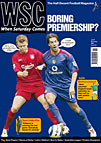 Is Russian football corrupt, internationally and domestically? That’s what Latvia’s captain was reported to have said and some clubs agree, as Dan Brennan reports
Is Russian football corrupt, internationally and domestically? That’s what Latvia’s captain was reported to have said and some clubs agree, as Dan Brennan reports
Ever since Stalin got together with Hitler to annex the Baltic states in 1940 as part of a secret carve-up, relations between Latvia and Russia have remained strained, something that 14 years of independence has done little to patch over. A Russian newspaper recently called for all good Russians to boycott Latvian tinned sprats – a culinary favourite since Soviet times – in protest at discrimination against Latvia’s Russian community. And August’s World Cup qualifier between the two countries in Riga threatened to spark a new international incident.
At the centre of the storm stood Vitalijs Astafjevs, once of Bristol Rovers. Latvia’s captain and most capped player scored a blinding opener that threatened to undermine Russia’s ailing World Cup hopes once and for all, before the visitors scraped a reply to grab a barely more useful point. But it was Astafjevs’ post-match offensive that really ruffled Russian feathers. He went on the record to a Latvian journalist, claiming that representatives of the Russian camp had tried to get Latvia to throw the game.
When the story ran in Latvia’s respected sports daily, Sport Avisa, the Russians, not surprisingly, issued an angry denial. “Utter rubbish” cried the new Russian Football Federation chief, Vitaly Mutko. His Latvian counterpart was quick to follow suit. “It is completely absurd. Nobody offered any money, not to federation officials or players,” said Janis Mezeckis “Vitalijs Astafjevs’ words were probably incorrectly interpreted, or the footballer did not express himself very well.”
Astafjevs himself affected a hasty U-turn. Given that he now earns his crust for Russian club Rubin Kazan, this was probably judicious. “I never have imagined that my careless words… would cause such a stormy reaction,” he said contritely in a subsequent interview in Russia’s Sport Express, invoking the “lost in translation” get-out to suggest that the interview, originally given in Russian, had perhaps been badly rendered into Latvian.
For all the protests and official denials, doubts linger. Astafjevs, Latvia’s most capped player with 117 appearances, is neither stupid nor lacking in eloquence. Sporta Avize enjoys a solid reputation and the interviewer Askolds Uldrikis is one of his country’s most respected football journalists. “I stand by what I wrote, because that’s the truth,” stated Uldrikis, who says he taped the interview. “He said it was not just rumours, but that there really were attempts to offer bribes from the Russian side.”
For those who follow Russian football, match-fixing rumours are not so shocking. The problem is getting anyone to speak about them, which is why the Astafjevs affair was so surprising.
Rumours of bribed opponents are almost as common as those of bent refs. FC Terek Grozny, who have defied the odds to provide Chechnya with Russian Premier League representation this season, recently claimed that they face a full-on conspiracy by the entire refereeing fraternity, rendering their participation in the top flight “unbearable and even pointless”. The club is so enraged it has appealed to the Kremlin to intervene.
“At first we thought it was just refereeing mistakes. Now after seven months of seeing these mistakes repeated game in, game out, we’ve no doubt that this is a targeted attack on the Chechen team by the refereeing body,” stated an open letter to President Putin from the Terek board, players and supporters. “There are clearly people in Russian football who want to see Terek removed from the Russian football elite and back in the first division…
“Based on the games alone, we do not deserve to be in last place. Unjustified penalties are being given against us. Our opponents are given dubious free-kicks that decide the outcome of matches… If the Russian Football Union is not able to supply impartial match officials for our remaining matches, we would like to request the appointment of foreign referees.”
The head of the referees’ union dismissed the claims as a desperate rant. But the Chechen table-proppers are not the only club clamouring for foreign refs. Whether they are not up to the job, or too open to offers of supplementary income, there is a growing sense that local officials are not to be trusted with important games. Ahead of their derby with CSKA recently, Spartak Moscow lobbied publicly for the appointment of outside officials. “In recent seasons, Russian referees have failed to withstand the pressure in our matches with the Army team, and have made serious mistakes as a result,” complained Spartak’s website.
Such incidents jar with the image presented by Mutko, who talks confidently of Russia’s ability to host European finals and international tournaments. It would seem he has a lot of work to do before that can happen.
From WSC 225 November 2005. What was happening this month